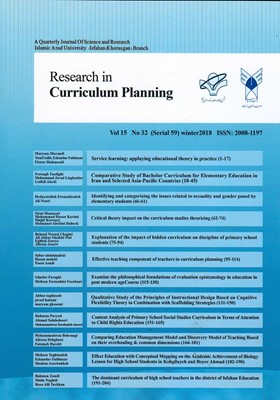Examine the philosophical foundations of evaluation epistemology in education in post modern age
Subject Areas : Research in Curriculum Planning
Ghader Faraghi
1
*
![]() ,
Mohsen Farmahini Farahani
2
,
Mohsen Farmahini Farahani
2
1 - M.A. Philosophy of education,shahed Unirercity, Tehran, Iran.
2 - Associate Professor of education sciences, shahed Unirercity, Tehran, Iran.
Keywords: construction oriented, post modern, Hermeneutics, Epistemology, Evaluation, Critical (Collaborative) and integration,
Abstract :
The philosophical foundations of evaluation epistemology in education in post modern age were examined in this study by four approaches (the construction oriented approach – Hermeneutics approach - Critical (Collaborative) approach and integration approach). The methodology of this study was documentary analysis. In order to answer to study’s questions, data gathered using appropriate forms, and analyzed by 5 traditional approaches. According to the thesis questions the main results are: post modern evaluation epistemology is based on critical and collaborative methods combined with qualitative and quantitative approaches. The result of this study is: the evaluation of this age should be combinatorial so that: all aspect of epistemology in the field of evaluation should be considered, all positive points of evaluation method should be considered, all racial, regional, cultural and personal difference should be considered with emphasis on current needs and goals, emotional and motivational and belief of learner should be considered because it will be driving factor for learning – teaching approach.
Bagheri, Q.,Yazdani, A. (2002) a pattern for research in educational evaluation based on hermeneutic view, educational innovations scientific – re search - periodical, number 1, page 39 to 58. [Persian]
Bast, J. (2000) research methods in behavioral & training sciences, the translation of Hassan pasha sharifi & Narges taleghani Tehran,growth publications.
Bola, H. S. (1990) evaluating educational plans for development, the translation of khodayar Ebili (1996), Tehran, international institute publications of adults education methods.
Chalmerz, A. (1995),the science quality: introduction in philosophical science logy schools, translation of saeid ziba kalam, Tehran, the center of scientific & cultural publications,the first edition
Fardanesh, H. (2008) theoretical basics of education al technology, Tehran,samtedition. [Persian]
Farmahini farahani, M. (2004), post modernism & education, Tehran, Eiyig publications. [Persian]
Farmahini farahani, M. (2013) clarifying histological principle of remote education system,research epistemology In education periodical, number 30 &,31, page 115 to 139. [Persian]
Gharibi, J.,Golestani, H.,Jafari, I. (2016).Epistemological Foundations of Multural Education. Journal Research in curriculum Planning.Vol 12,No 20(continus 47).pp 1-15. [Persian]
Gary ling, E,C, & others (2001) new views in philosophy, translation of mohammad saeidi mehr & others,Qom, taha cultural institute publications.
Haghighat, S. S. (2006). politic science methodology, Qum, Mofid. [Persian]
Hoolab,R. (1999) yorgen habermas (criticism in general area), translation of Hossein Bashirieh,Ney publications, Tehran, second edition.
House.E.R(1983)" Assumptions underlying Evluation Models "in G.E.Madaus,M.Scriven and D.L. Stufflebeam (Eds),Evaluation Models, Boston:Kluwer Nijhoff
Hovy, D. K. (1999),Critical cycle, translator: Morad Farhadpoor, Tehran, intellectuals & women studies.
kardan, A. M. & others (2001) education philosophy, Tehran, samt publication, first edition. [Persian]
kermati,M. R. (2013), academic plan evaluation capprouch institute), Tehran, Roshd publication, first edition. [Persian]
kiamanesh, A. R. (1994) educational evaluation methods (training sciences course), Tehran, payam Noor university. [Persian]
Mansoob Busiri,M. (2004).philosophical principals of educational evaluation models, Tehran,university jihad application – scientific high education institute publications. [Persian]
Meri Rosnao, P. (2001) post modernism & social sciences, translation of mohammad Hossein kazemzadeh,Tehran, Atieh publication
Mirza mohamdi,& colleagues(2010) clarifying histological reasons of structurism approach in evaluating academic development, daneshvar scientific- re search metrology number 45, page 127 to 140. [Persian]
Moosa poor, N., (2002) theoretical principles of educational evaluation models,research & programming periodical in high education, number 24-23 (scientific & research). [Persian]
Naghibzade, M. A. (1988), a view to the education philosophy,Tehran, tahoori publications. [Persian]
palmer, R. (1998), hermeneutic science,translation of mohammad saeid kashani, Tehran, Bina.
Patton,M. (2002)"qualitative research and Evluation Methods".london:sage.
Pinar, W.F.,Reynolds, W. M.,Slattery,P.,and Taubman, P.M. (1996).Understanding Curriculum.New York:Petr Lang.
Saif, A. A. (2013),measurement, educational evaluation, Tehran, Doran publication. [Persian]
Shariat madari, A. (1991) the society & education, Tehran,Amir kabir publications,the ninth edition. [Persian]
Valvy, P.,Bagher poor, S.,Shahsavari, J. (2016).Examining critical thinking in University graduate students.. Journal Research in curriculum Planning.Vol 13,No 22(continus 49).pp 184-192. [Persian]
wolf,R. (1992) evaluation (plan evaluation & ability evaluation basics), translation of Ali Reza kiamanesh, first edition,Tehran: university publication.
_||_
